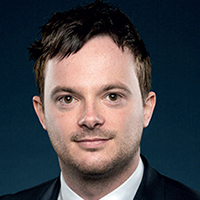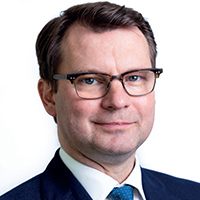 Five leaders from across the fund management field share their experiences of how digital advances have shaped the sector in recent years – and what further digital development might mean for operating models, risk management, analytics and transparency in future
Five leaders from across the fund management field share their experiences of how digital advances have shaped the sector in recent years – and what further digital development might mean for operating models, risk management, analytics and transparency in future
The director of funds: Richard Hansford, Ocorian
The 2008 financial crisis triggered a huge shift in investors’ appetites. All of a sudden there was a huge demand for robust, scalable technology and systems to support fund structures and their underlying investment activity.
Since then, there has been a steady movement towards what can be added to that capability, providing end-to-end solutions to clients in a digitised format.
Having solid institutional technology is now a must for fund management. Clients want on-demand access to granular information, and expect us to continue to deploy and develop technology around our administration platforms to streamline data flows from the asset, up through the structure and then back to the investors and the general partner themselves.
Given the increase in regulation and investor scrutiny, it’s only going to continue growing in importance.
As a provider, Ocorian embraced this shift towards digital technology very early, so despite the challenges caused by Covid-19, moving to a decentralised way of working was a relatively straightforward exercise for us.
But in future, the challenge firms will have is that clients will want to use these digital technologies in different ways. So having an agile platform is really important to ensure that it has the flexibility to adapt to each individual’s requirements.
Among their advantages is the speed of information delivery, but also, importantly, the accuracy of the data.
Using dedicated smart technology helps us to expedite processes and enables our team to spend more time actually talking to the client – understanding what they’re up to, what their plans are for the next quarters, industry trends that may be impacting their development – and analysing the information rather than actually keying it all in.
Essentially, going digital has changed the dynamic, so we can provide more of a partnership mentality and become an extension of their own operational team.
Going forward, while it’s important for companies to have a roadmap, the most important thing is that it must always be evolving. Technology is not standing still: nor should your technology strategy.
 The investment strategist: Russell Newton, CoinShares
The investment strategist: Russell Newton, CoinShares
My business partner Danny Masters and I have always been very pro-digital. After working together as oil traders, we set up our own hedge fund in the commodities space.
Then, 10 years ago we moved the business to Jersey and began to look for inspiration for a new venture. Danny stumbled across the Satoshi Nakamoto white paper and saw that Bitcoin looked very much like some of the areas we were already trading in.
It had limited supply, it was likely to be quite volatile, and it sometimes felt like it was a currency, while at other times it behaved more like a store of value or a commodity.
We realised that there was a potential opportunity here to be at the bleeding edge of a new asset class, and what was needed was a way for investors who were curious to work with a trusted partner who was going to take care of all the complicated stuff.
So, we approached the Jersey Financial Services Commission and said we wanted to be the world’s first regulated Bitcoin hedge fund.
It quite bravely agreed to run with it. Today, we have broadened out and find ourselves actively trading again, using highly automated trading systems to provide liquidity to customers alongside a corporate ventures arm.
The digitisation of this industry is undoubtably a good thing. A lot of companies now are not really even flagging that something is powered by a cryptographic protocol, or utilises cryptocurrency – they’re simply highlighting to their customers that it’s better, faster and cheaper.
But we’ve got to get the regulators on board too, which will involve letting go of old, trusted methods.
There’s an adoption curve: you need buy-in from multiple different sectors – your regulator, your customers, your compliance department – and in financial services it can be incredibly tricky to implement solutions that could very clearly save hundreds of millions of dollars for large institutions.
However, together with other, broader blockchain uses – such as the introduction of zero knowledge proofs – digitisation will make the industry safer as well as more efficient and profitable in the long term.
 The digital pioneer: Martin Keelagher, Agile Automations
The digital pioneer: Martin Keelagher, Agile Automations
Fund management is an innovative sector, and we have seen a lot of investment funds already using robotics and algorithms for their trading portfolios, embracing machine learning. There’s also the potential to offer new tools that could help active investors outperform the traditional indexes.
But that’s just the tip of the iceberg. Look at the things we help with – bespoke robotic process automations, robotic desktop automation, artifical intelligence and machine learning, creating purpose-built automations for our clients to meet their specific needs.
That includes everything from automating administrative processes to completely overhauling old, antiquated systems.
The whole fund management space has changed dramatically over the past 10 years. Since the crash in 2008, regulations and due diligence have rightly ramped up, and this growth in the risk and governance space has massive cost implications for businesses.
Before this, it was very difficult to see all of a financial institution’s exposures at any one time because they were just so vast, with millions of transactions happening every day.
That’s where technology and robotics really come into play: they can act as a supercharger to individuals, making data instantly available wherever you are in the world in an accurate and meaningful way.
The time that bots can save us is a huge factor. Millennials are now earning more disposable income and are looking to invest – but they want everything instantly. Tech can swoop in and revolutionise a company’s processes quickly, putting them on the cutting edge digitally and enhancing customer service and controls, thereby ensuring there’s a quick ROI.
One of the big misconceptions about robotics is that it is going to completely replace human roles. But the reality is, most of the time, robotics is simply speeding up processes and ensuring a better level of accuracy and security.
This year’s pandemic has proven how difficult labour-intensive administration roles are, especially when you’re not working in the office.
Our view is that these digital developments unlock the workforce’s potential and allow them to focus in on the high-skill areas where the human touch is irreplaceable, such as relationship building.
But working alongside humans, there’s no doubt that technology has a colossal opportunity to add value to the fund management proposition.
 The consulting director: Simeon Moss, Deloitte
The consulting director: Simeon Moss, Deloitte
As an industry, fund management has predominantly been relationship-led, and until recently it’s lagged behind the rest of the financial services sector when it comes to digital adoption.
However, recently, and especially throughout the Covid-19 pandemic, we have seen that digital transformation is very firmly on the agenda.
And given that a large number of fund management middle- and back-office processes are delivered through third parties, this transformation will need to happen along the value chain for the full benefits to be realised.
Deloitte’s 2019 European Investment Management Survey demonstrated that while price points and expertise within asset service providers rated highly, around 55% of asset managers were dissatisfied with the digital capabilities of their service providers.
Respondents felt this needed to be a strategic priority going forward and, as such, digital capabilities are becoming a premium criteria and differentiator when selecting a fund administrator.
Now, together with the momentum brought about by Covid-19, there is a critical mass that will put digitisation at the top of people’s agendas, both for productivity reasons and in order to build operational resilience and manage cyber threats.
It seems reasonable to suppose that the firms that lead the way with digitisation could not only achieve improved operational efficiencies but also consolidate their lead through future acquisitions or organic growth if asset managers switch service providers.
And, while many organisations go about digitisation on a piecemeal basis, at Deloitte we advise clients to think big in terms of strategy and roadmap while still implementing in measurable achievable projects.
In the Channel Islands we’re seeing this not only as a development for cost efficiency, but to free up talent to undertake other value-added activities and create new business opportunities.
Becoming cloud-native and considering data is an essential component, and a modern data architecture, will also make a big difference when it comes to new reporting areas such as ESG criteria, because it will enable companies not only to better measure and track their own performance, but also those of their third-party partners.
Likewise, it will better equip companies to manage third-party risks.
The Channel Islands are well positioned to be at the forefront of this digitisation. The size and proximity of the industry here lend the sector to fast adoption, and there is a synergy between businesses, the local government and industry bodies that has helped further progress.
Having a joined-up ecosystem that promotes the digital agenda, in turn makes it attractive for fintech companies and investment.
 The head of trustee and depositary services: Mark Crathern, NatWest
The head of trustee and depositary services: Mark Crathern, NatWest
NatWest was digitising processes before the pandemic hit, but we were still using 1.8 million pieces of paper a year. When our offices closed, we had to transition to a paperless environment overnight.
Now, we know we can’t – and we won’t – go back to using that amount of paper. Instead, we’re accelerating our migration to cloud-based technologies with the Microsoft Azure suite, which will enable us to deliver sustainable efficiencies that will ultimately benefit fund investors.
It’ll also give us the ability to thoroughly interrogate data and identify insightful themes and trends that will benefit fund managers and investors.
Demising old legacy core platforms can be exceptionally expensive and some institutions can’t justify that outlay, instead relying on application programming interfaces to communicate between old and new technologies.
But that’s never going to be able to compete with the latest cloud technology, which is more agile and efficient to deliver change and benefits.
For us, it’s an investment that should deliver returns in just two years. We’re also exploring and experiencing further uses for AI and drones.
The bank already uses various forms of AI, but now it will also enable us to review and extract data from prospectuses, ensuring that we always have the latest, most accurate information to hand.
In time, it’ll be a lot easier to read the new standardised blockchain agreements and identify any anomalies, but it’ll also mean investors will be far better informed, not just of their investment status but also the reasons behind any changes.
Even drones are beginning to be utilised by financial institutions. In the property funds space, independent surveyors called a material uncertainty event when the pandemic hit because they couldn’t go out to value properties.
In turn, that meant you couldn’t value the funds, and investors couldn’t make informed decisions about whether to invest or to set up a fund. So in some instances, drones have been sent out to at least perform external checks and keep that information flowing. That’s only likely to continue – and develop – in the future.